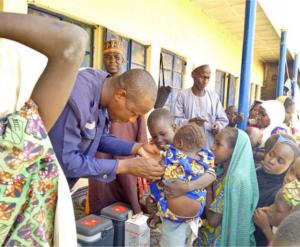Borno state boosts immunity of over 200 000 children against measles disease in newly accessible areas
Maiduguri, 28 May 2018 - In a bid to interrupt measles transmission in parts of Borno state as well as boost vulnerable population’s immunity in newly accessible areas, the World Health Organization (WHO) is providing technical and financial support to the Borno state health authorities to implement a selective measles vaccination campaign.
The 4-day (26-29 May 2018) exercise targets more than 200 000 children aged six months – 15 years recently accessed locations across nine (9) local government areas (LGAs) of the state. The LGAs are Magumeri, Nganzai and Damboa where suspected outbreaks of measles were reported in April 2018. Other LGAs include Bama, Dikwa, Gwoza, Kukawa, Kala Balge and Ngala where large numbers of children who have not been vaccinated since 2014 are resettling.
WHO already trained and deployed 219 vaccination teams to deliver potent measles vaccine to all eligible children in these areas with a view to stopping transmission and strengthening resistance to the spread of the disease among the population of unvaccinated newly liberated children.
According to Dr Wondimagegnehu Alemu, the Country Representative to WHO Nigeria “WHO is at the forefront of the ongoing measles vaccination campaign in Borno state to interrupt the reported outbreaks of measles in parts of the state as well as ensure that newly accessible children are protected from measles infection, wherever they are re-settling.”
Earlier in April 2018, suspected measles outbreaks were reported in Magumeri, Nganzai and Damboa LGAs of Borno state involving more than 350 children with 61 deaths.
“The current enhanced vaccination campaign against measles in Borno is most appropriate in view of the fact that outbreaks have been reported in some LGAs,” said Alhaji Babagana Abiso, Director, Disease Control at the Borno State Primary Healthcare Development Agency. “This is even more commendable as children who have not been reached with vaccinations against measles since 2014 are resettling in most of these LGAs including Bama, Dikwa, Gwoza, Kukawa, Kala Balge and Ngala.”
The humanitarian crisis caused by conflict in Borno state has left 3.2 million people in need of various assistance including more than 1.3 million internally displaced persons (IDPs). With more than two-thirds of health facilities destroyed or partially functional, the population, especially children, are vulnerable to infectious diseases like measles, malaria, respiratory infections and diarrhoea. The combination of malnutrition, malaria and measles increased child deaths up to 4 times higher than what is considered the emergency threshold (8 deaths per 10 000 children aged under 5 years per day).
Measles is a highly contagious disease and a leading cause of death in young children. In 2015, there were more than 134 000 measles deaths globally; most of them were children aged less than 5 years.
Records indicate that in 2000-2015, measles vaccination prevented an estimated 20.3 million deaths, making measles vaccination one of the best public health interventions.
Technical Contact:
Dr PETER LASUBA, Clement Lugala, Email: clementp [at] who.int (clementp[at]who[dot]int); Tel: +234 906 2861 215



